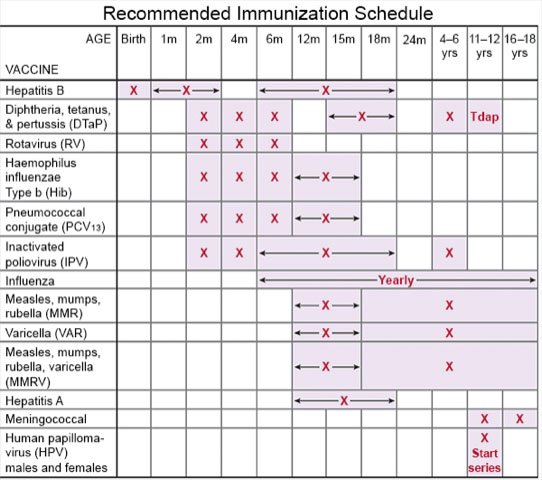The Importance of Immunizations (Vaccines) for Children
Medically reviewed by Drugs.com. Last updated on Aug 4, 2025.
AMBULATORY CARE:
Why immunization is important:
Immunization helps your child become immune (protected) from diseases caused by bacteria or viruses. It also helps protect others around him or her. Without immunization, the only way to become immune is to get the disease. This is dangerous because your child can develop medical problems from the disease that may be long-term or difficult to treat. Immunization helps control diseases and prevents them from coming back after they are controlled.
 |
How immunization is done:
Inactivated (killed) or weakened (live) forms of viruses or bacteria may be used. Pieces of protein from a virus may be used to teach your child's immune system to recognize the virus. Vaccines are usually given as shots or nasal sprays. The vaccine will cause your child's body to produce antibodies. Antibodies are part of your child's immune system. Your child's immune system will recognize the virus or bacteria if he or she is exposed again. The system will produce the same antibodies to prevent the disease.
Related medications
Treatment options
The following list of medications are related to or used in the treatment of this condition.
- measles virus vaccine/mumps virus vaccine/rubella virus vaccine/varicella virus vaccine
- ProQuad
- Rotarix
- RotaTeq
- rotavirus vaccine
Diseases that can be prevented by vaccines:
- Cholera
- Coronavirus disease 2019 (COVID-19)
- Dengue
- Diphtheria
- Hepatitis A and hepatitis B
- Haemophilus influenzae type b (Hib) and influenza (flu)
- Human papillomavirus (HPV)
- Measles and mumps
- Meningococcal disease, such as meningitis
- Pertussis (whooping cough)
- Pneumococcal disease, such as pneumonia
- Polio
- Rotavirus
- Rubella
- Smallpox and Mpox
- Tetanus
- Tuberculosis (TB)
- Varicella (chickenpox) and zoster (shingles)
What you need to know about immunization:
- You will get a Vaccine Information Statement (VIS) for each vaccine your child receives. The VIS will explain what the vaccine is for and its risks and benefits. You may be able to read the VIS before your child receives the vaccine. The VIS may be printed or delivered electronically to you. Other written information will be given if a vaccine does not have a VIS yet.
- Some vaccines are given on a recommended schedule. Your child may need some vaccines each year to protect him or her from new forms of a virus, such as the flu. Your child will receive several vaccines, starting a few weeks after birth. He or she will need 2 or more doses of each vaccine. Some vaccines may be given at the same time as others. Examples include pneumococcal, hepatitis B, Hib, polio, and DTaP vaccines. Your child may also need boosters. Follow the immunization schedule your child's healthcare provider gives you, or bring your child in for catch-up doses.
- Some vaccines will protect your child when he or she is older. For example, hepatitis A is not usually a risk for children. The vaccine will help protect your child from hepatitis A when he or she becomes an adult. The chickenpox vaccine will help protect your child from shingles when he or she becomes an adult. The virus that causes chickenpox also causes shingles.
- Some vaccines are only given for certain situations. Your child may need rabies vaccines if he or she is bitten by an animal that can carry rabies. Your child may need certain vaccines before traveling to another country. Tell your child's provider as far as possible before he or she travels. The vaccines may take several weeks to become effective.
- Vaccines will not increase your child's risk for autism. Some parents worry that vaccines increase the risk for autism. Research shows there is no connection between vaccines and autism. Talk to your child's provider if you have concerns about the risk for autism.
- Keep a record of the vaccines your child receives. Your child's provider may also keep electronic records. Records will help you make sure your child receives all the vaccines he or she needs, and at the right times. Your child may need the records to be able to enroll in school or college, or to play sports. Bring the record with you to each immunization visit.
Risks of immunization:
Vaccines may cause severe allergic reactions in some people. Tell your child's healthcare provider if your child has any allergies or a weakened immune system. Your child may not be able to get live vaccines if his or her immune system is weakened. Rarely, vaccines may cause serious injury or death.
© Copyright Merative 2025 Information is for End User's use only and may not be sold, redistributed or otherwise used for commercial purposes.
The above information is an educational aid only. It is not intended as medical advice for individual conditions or treatments. Talk to your doctor, nurse or pharmacist before following any medical regimen to see if it is safe and effective for you.
Learn more about The Importance of Immunizations for Children
Treatment options
Care guides
- Meningococcal Vaccine for Adults
- Meningococcal Vaccine for Children
- The Importance of Immunizations (Vaccines) for Adults
- The Importance of Immunizations (Vaccines) for Children
Medicine.com guides (external)
Further information
Always consult your healthcare provider to ensure the information displayed on this page applies to your personal circumstances.
